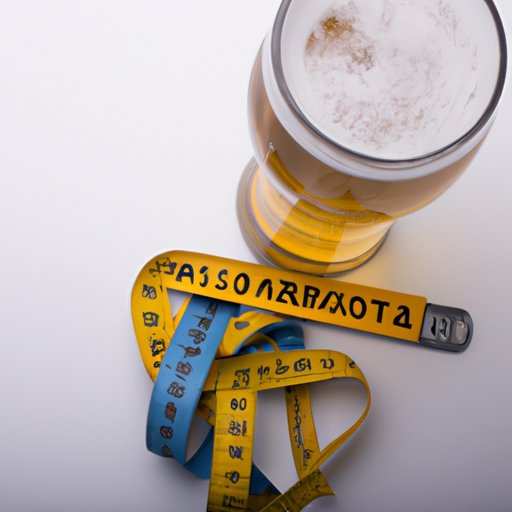
Why Does Beer Make You Fat?
For many people, a cold beer is the perfect way to unwind after a long day or enjoy a night out with friends. However, the calories in beer can add up quickly, leading to weight gain over time. In this article, we will explore how beer can contribute to weight gain and provide tips for managing your waistline while still enjoying your favorite brews.
Nutritional Content of Beer and its Contribution to Weight Gain
One of the main reasons why beer can make you fat is its high calorie and carbohydrate content. A typical beer can contain anywhere from 100 to 300 calories per serving, depending on the brand and type of beer. This may not sound like much, but over time, those calories can add up.
In addition to its high calorie content, beer also contains carbohydrates in the form of sugars and starches. These carbs can contribute to weight gain, particularly if you are not burning them off through exercise.
Another factor that makes beer unique among beverages is how the body metabolizes it. Unlike other nutrients, alcohol is not stored in the body’s cells as energy. Instead, it is metabolized in the liver and converted into fat, which is then stored in your body.
High-carbohydrate beers, like wheat beer, can also increase insulin levels, leading to fat storage. Insulin is a hormone that helps the body regulate sugar levels in the blood. When insulin levels are high, the body is more likely to store fat.
How Beer Affects Metabolism and Fat Burning
When you drink beer, the liver processes the alcohol instead of breaking down fat for energy. This can slow down the body’s ability to burn fat, making it harder to lose weight. In addition, alcohol can cause insulin resistance, which can lead to weight gain over time.
The liver also plays an important role in fat metabolism. When you drink too much alcohol, the liver can become overwhelmed and unable to process fat efficiently. This can contribute to weight gain, particularly in the abdominal area.
Excessive Drinking and Caloric Intake
Excessive drinking can lead to increased caloric intake and weight gain. When you are drinking, you are more likely to reach for high-calorie snacks like chips or pizza. Over time, these extra calories can add up and contribute to weight gain.
Binge drinking can also slow down the body’s ability to burn fat. When the liver is busy processing alcohol, it cannot process fat as efficiently, leading to weight gain over time.
Beer’s Impact on Appetite and Weight Gain
Beer can increase appetite, leading to overeating. Studies have shown that alcohol can increase levels of ghrelin, a hormone that stimulates hunger. This can make it difficult to manage your appetite while drinking beer.
In addition, beer consumption can lead to cravings for unhealthy foods, like salty snacks or fast food. These types of foods are often high in calories and can contribute to weight gain over time.
To manage your appetite while drinking beer, try eating a healthy snack before you start drinking. This can help you feel full and prevent overeating later on. You can also try drinking water between beers to keep you hydrated and help you feel full.
The Link Between Beer and Cortisol
Stress can also play a role in weight gain. When you are stressed, the body produces cortisol, a hormone that can contribute to weight gain and abdominal fat. Studies have shown that beer consumption can increase cortisol levels, making it harder to lose weight.
To manage stress while drinking beer, try to limit your intake and practice relaxation techniques like deep breathing or meditation. You can also try to limit your overall stress levels through regular exercise or other calming activities like yoga or reading.
Reduced Physical Activity
When you drink beer, you may also be less likely to engage in physical activity. This can contribute to weight gain over time. To avoid this, try to balance your beer consumption with regular exercise. You can also choose activities that you enjoy, like dancing or hiking, to make exercise more enjoyable.
Comparing Calorie Content of Different Types of Beer
Not all beers are created equal when it comes to calories. Light beers, for example, typically contain fewer calories than regular beers. In addition, beers with lower alcohol content also tend to have fewer calories.
When choosing a beer, look for those with lower calorie and alcohol content. You can also try splitting a beer with a friend or choosing a smaller size to reduce your overall calorie intake.
Conclusion
While beer can contribute to weight gain, it doesn’t have to be a major factor in your overall health. By being mindful of your intake and making healthy choices, you can still enjoy your favorite brews while managing your weight. Remember to balance your alcohol intake with physical activity and choose lower-calorie options when possible. With these tips in mind, you can still have a good time without worrying about packing on the pounds.





